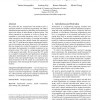Free Online Productivity Tools
i2Speak
i2Symbol
i2OCR
iTex2Img
iWeb2Print
iWeb2Shot
i2Type
iPdf2Split
iPdf2Merge
i2Bopomofo
i2Arabic
i2Style
i2Image
i2PDF
iLatex2Rtf
Sci2ools
OOPSLA
2007
Springer
2007
Springer
Transactions with isolation and cooperation
We present the TIC (Transactions with Isolation and Cooperation) model for concurrent programming. TIC adds to standard transactional memory the ability for a transaction to observe the effects of other threads at selected points. This allows transactions to cooperate, as well as to invoke nonrepeatable or irreversible operations, such as I/O. Cooperating transactions run the danger of exposing intermediate state and of having other threads change the transaction’s state. The TIC model protects against unanticipated interference by having the type system keep track of all operations that may (transitively) violate the atomicity of a transaction and require the programmer to establish consistency at appropriate points. The result is a programming model that is both general and simple. We have used the TIC model to re-engineer existing lock-based applications including a substantial multi-threaded web mail server and a memory allocator with coarse-grained locking. Our experience conď¬...
Related Content
| Added | 08 Jun 2010 |
| Updated | 08 Jun 2010 |
| Type | Conference |
| Year | 2007 |
| Where | OOPSLA |
| Authors | Yannis Smaragdakis, Anthony Kay, Reimer Behrends, Michal Young |
Comments (0)

